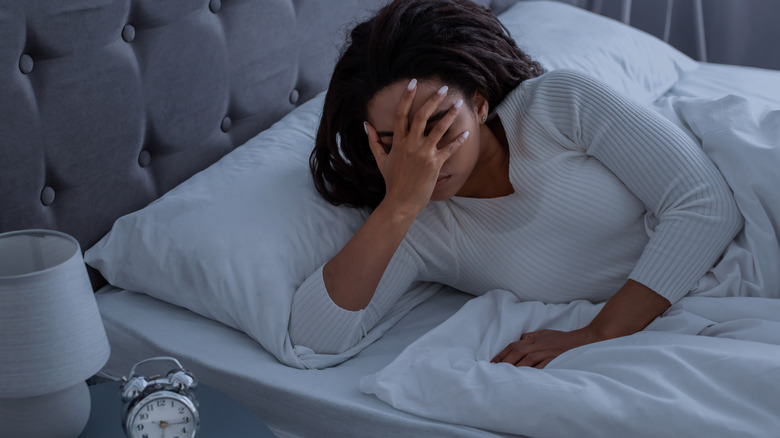Sleep Mistakes That Can Increase Your Risk Of Cancer
There's no discounting the fact that waking up from quality sleep of 7-9 hours every day makes you feel energized and ready to tackle the day ahead. When we were kids, sleeping seemed like a waste of precious time that could've otherwise been spent playing with friends or watching TV. But as we grew older, we learned that a lot actually happens when we snooze — our memories get consolidated and our immune system and metabolism are strengthened. Sleep also plays a part in how our hormones are regulated.
Safe to say, sleep is an important part of healthy living, so it's not entirely surprising to find that not sleeping well or changing your sleep schedule can lead to illness. In fact, sleeping during the day and staying awake at night, otherwise known as shift work, has been linked with cancer risk, per a National Toxicology Program (NTP) report published in 2021. Those who regularly work night shifts and those who've been on night shifts for 10 years or more are particularly at risk. The International Agency for Research on Cancer (IARC) has shared this concern too via an evaluation released in 2019.
These reports follow existing studies done on the subject, involving animals and humans. For example, a 2018 study published in Neuroscience & Biobehavioral Reviews found a link between breast cancer and sleep schedule disruption. A 2013 study published in Sleep Medicine Reviews found a link between high breast cancer incidence and Caucasian women night workers and shift workers. What is it about shift work that puts you at higher risk for cancer?
Circadian rhythm disruption could increase cancer risk
All of us have an internal body clock called the circadian rhythm, or circadian cycle. It's a 24-hour clock that regulates when we feel sleepy, hungry, and alert. The circadian rhythm also has a role to play in our mood and mental health, metabolism, and regulation of blood sugar and cholesterol. This internal clock is driven by light — meaning when it's light out, our body naturally becomes alert and when darkness comes, it prepares to head to bed.
With night shifts, there is a disruption in this natural order of the circadian rhythm. This can change the way certain chemicals work in your system. For example, melatonin, which we refer to as the sleep hormone, is secreted from the brain's pineal gland in response to darkness. It promotes sleep. Turns out, it performs another important role of inhibiting the growth and spread of cancerous cells. When there's a disruption in your circadian rhythm, melatonin levels in your system can be reduced. This could put you at more risk of developing cancer.
It is also possible that a disrupted sleep schedule can negatively impact your immune system. A weak immune system puts you at greater risk for illness. Night shifts also mean a lack of exposure to daylight and therefore vitamin D. Science has previously linked low vitamin D levels with cancer risk. Shift work aside, are there other sleep mistakes you're making that are putting you at risk of cancer?
The connection between sleep duration and cancer
There has been some science related to sleep duration and cancer risk. A 2023 study published in the journal Cancer observed incident cancer risk in people who slept for less than seven hours and in women with short, stable sleep trajectories.
There's even some science suggesting that oversleeping could lead to chronic disease. But experts seem divided on the topic. "We don't exactly know the cause and effect. It probably works the other way, that when you are sick, it leads to more sleep time," explained neurologist and sleep specialist at Johns Hopkins Medicine, Dr. Charlene Gamaldo. Either way, these studies, in one way or another, point toward the importance of getting your recommended hours of sleep — which is 7-9 hours for adults.
As for shift workers and cancer risk, if there's nothing you can do about getting on a different schedule, experts recommend prioritizing an otherwise healthy lifestyle inclusive of a balanced and nutritious diet, plenty of exercise, getting enough vitamin D, limiting alcohol consumption, quitting smoking, and maintaining a healthy weight. It also won't hurt to get regular checkups, especially if you feel as though your disruption in sleep is manifesting in fatigue, gastrointestinal issues, cognitive problems, and poor mental health. Doing cancer screenings, including mammograms and colorectal and prostate cancer checks, can also help. There are also ways in which you can balance your circadian rhythm when you work nights — like blackout curtains and light exposure.



